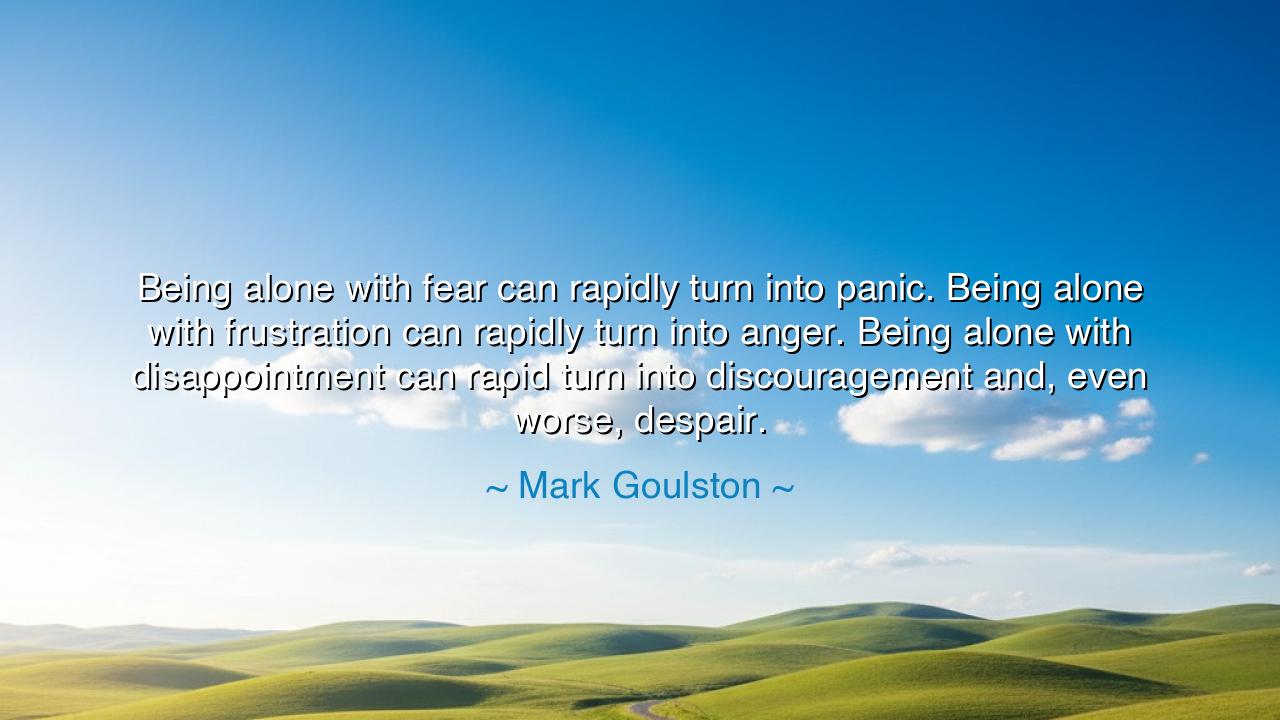
Being alone with fear can rapidly turn into panic. Being alone
Being alone with fear can rapidly turn into panic. Being alone with frustration can rapidly turn into anger. Being alone with disappointment can rapid turn into discouragement and, even worse, despair.






In the words of Mark Goulston, “Being alone with fear can rapidly turn into panic. Being alone with frustration can rapidly turn into anger. Being alone with disappointment can rapidly turn into discouragement and, even worse, despair.” These words speak to the powerful forces of the human mind, where solitude can be both a source of strength and a potential breeding ground for negative emotions. Goulston’s insight reveals a deep truth about the nature of human experience—when we are alone with our thoughts, especially when faced with fear, frustration, or disappointment, those emotions can escalate rapidly, consuming our minds and spirits if left unchecked. The dangers of isolation, in this sense, lie not in the absence of others, but in the unchecked growth of negative feelings that arise when we are left alone to stew in them.
The ancients understood the importance of companionship and the need for balance in the human soul. In the Hellenistic era, Aristotle wrote extensively about the concept of philia—a form of friendship that is essential for human flourishing. Philia is the bond that brings clarity and perspective in times of emotional turmoil. Aristotle recognized that humans are social creatures, and that isolation can lead to the magnification of negative emotions. For him, the company of trusted friends was a crucial remedy for the overwhelming emotions that can arise from being alone with one’s own thoughts. The wisdom of the ancients teaches us that fear, frustration, and disappointment can become powerful forces that shape our lives, but they need not define us if we seek the balance and perspective that comes from the presence of others.
Consider the life of Odysseus, the hero of Homer’s Odyssey, who spent years trapped on the island of Calypso, isolated from his family and companions. In his loneliness, he was consumed by a profound sense of despair, longing to return home. Solitude in this case served only to deepen his emotional turmoil. It was only through the support of friends and the eventual arrival of divine guidance that he was able to overcome his despair and continue his journey. Odysseus’ experience teaches us that in the face of fear or frustration, we must not allow ourselves to fall prey to despair but should seek help and support from those around us, just as he eventually found salvation through the gods and his companions.
In the modern world, Winston Churchill’s leadership during World War II offers a poignant example of how isolation and negative emotions can escalate in times of crisis. Churchill faced the tremendous weight of leadership during one of history’s darkest hours. In moments of doubt, frustration, and fear, he could have easily succumbed to panic and despair, especially in the face of overwhelming odds. Yet, he found strength in his deep resolve and the company of others who shared his determination. The lessons Churchill imparted were not just about the strength of a nation, but about the power of community and steadfastness in overcoming emotional storms. He exemplified how facing fear and frustration with the support of others can transform those feelings into action and purpose.
The lesson Goulston’s quote teaches us is the danger of being alone with our negative emotions, especially when fear, frustration, or disappointment arise. In solitude, those emotions can grow unchecked, turning into more severe reactions like panic, anger, discouragement, and ultimately, despair. Yet, Goulston also hints at the power of awareness—the ability to recognize when our emotions are beginning to spiral, and to seek the support of others before those emotions have a chance to overwhelm us. Solitude, in its proper context, can lead to reflection and growth, but in the absence of balance and external support, it can lead to isolation and emotional ruin.
In our own lives, the lesson is clear: we must not face fear, frustration, or disappointment alone. When these feelings arise, we must seek the counsel of others, engage in meaningful conversations, or find healthy outlets for our emotions. Action is key: rather than letting negative feelings fester in the silence of solitude, we must find ways to express them in productive and healing ways. Whether through conversation, exercise, or creative outlets, we can prevent the spiral into despair by engaging with others or the world around us in a way that brings balance and clarity.
Let us take action: In the face of negative emotions, let us reach out—whether to a trusted friend, family member, or mentor—and share our burdens. Let us seek balance in our emotional lives, recognizing when fear, frustration, or disappointment is growing within us and acting to defuse it before it consumes us. Through connection, self-awareness, and reflection, we can navigate the storms of life with strength and clarity, turning potential despair into an opportunity for growth and resilience. By doing so, we free ourselves from the trap of emotional isolation and ensure that we remain steadfast in the face of life’s trials.






AAdministratorAdministrator
Welcome, honored guests. Please leave a comment, we will respond soon